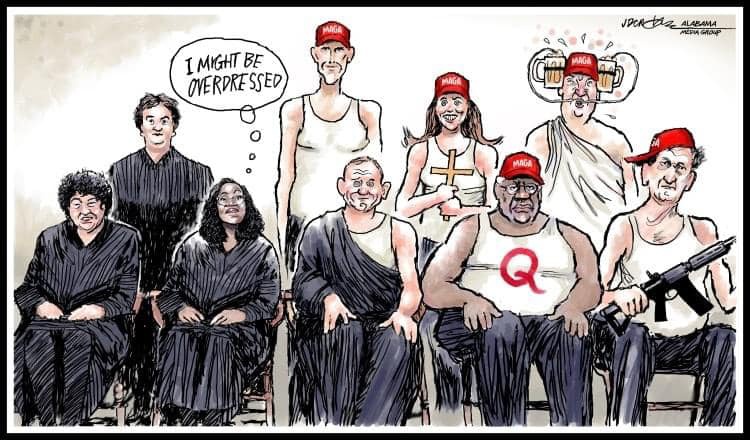It absolutely WAS a right. The fact that you approve of taking away that right notwhithstanding
1. Ending affirmative action
- Students for Fair Admissions v. President and Fellows of Harvard College
- Students for Fair Admissions v. University of North Carolina
Two cases could see the Supreme Court decide that colleges can no longer consider race as one of several factors when making admissions decisions, a move that would overturn four decades of precedent and deal a major blow to efforts to diversify college campuses and address historic inequality. Affirmative action has given a chance to
those historically shut out of the system because of their race, ethnicity, income, or identity. Students of color remain underrepresented on many campuses; and in states that have eliminated affirmative action, public universities have seen
dramatic declines in the number of minority students admitted.
Affirmative action helps promote diversity in ways that a focus on economic disparity alone cannot. Race-conscious remedies, including protections for voting rights and affirmative action, are
supported by the Constitution. They have long been part of American history and are fundamental to equal opportunity.
2. Weakening the Voting Rights Act
The Supreme Court has repeatedly diluted the Voting Rights Act over the past decade, and the latest case could open the door for states to further marginalize Black voters. Section 2 of the act requires voting districts to be drawn in a way that does not unfairly dilute the voting power of racial minorities. But last year, Alabama lawmakers
drew a congressional map with only one majority-Black district out of seven in a state where 27 percent of the electorate is Black. That’s a
textbook violation of the law, and a three-judge panel ordered the state to redraw the districts.
Now, the Supreme Court could reverse that decision, despite the fact that carving up Alabama’s Black Belt communities—historically Black areas in the state—to dilute Black voting power is
exactly the kind of discriminatory impact the law was designed to prevent. Alabama’s radical claim that its map is race-neutral is just a subterfuge for discrimination. If the justices water down the meaning of the Voting Rights Act to prevent states from taking race into account when drawing districts, it will
render the law toothless and likely lead to fewer Black members in Congress.
The country has made incredible progress over the past six decades in making Congress more diverse. This year,
25 percent of congressional lawmakers are people of color—a record high—compared with 40 percent of the United States. A Congress that looks like America gives people the confidence that they have a true voice in government; and these lawmakers are more likely to address the needs of their constituents.
3. Giving businesses a license to discriminate
The Supreme Court is considering whether businesses have a First Amendment right to refuse certain services to same-sex couples. The case involves a Colorado website design company owner who refused to design websites for same-sex marriages, citing her free speech rights. Lower courts found the owner
violated state law that requires businesses to offer the same services to everyone, regardless of sexual orientation.
If the court sides with the website owner, businesses could wield so-called claims of free speech as a license to discriminate,
undermining laws that prevent discrimination in public accommodations. Such a ruling could open the door for businesses to use artistic freedom, among other claims, as an excuse to discriminate against the LGBTQ community and other historically disadvantaged groups.
Businesses must operate under the framework of anti-discrimination laws and serve all customers equally, regardless of race, religion, gender, or sexual orientation. Members of the LGBTQ community should be free to access goods and services with the same dignity and respect afforded to everyone.
4. Saddling students with debt
- Biden v. Nebraska/U.S. Department of Education v. Brown
The court will decide whether the Biden administration had authority to forgive student loans for millions of borrowers due to the COVID-19 pandemic. At issue in this case is the Higher Education Relief Opportunities for Students Act, a 2003 law empowering the secretary of education to waive or modify student loan terms during emergencies. The
administration’s plan makes 43 million borrowers eligible for some debt forgiveness, while 20 million could have their debt completely canceled.
Yet during oral arguments, conservatives on the court were skeptical that Congress issued a clear enough mandate for debt cancellation in the law. If the court rules against the Biden administration, it will take away a lifeline for millions of households crushed by student loan debt. Moreover, such a decision would prolong the student debt crisis and prevent millions of Americans from improving their financial security and creating a foundation for upward economic mobility.
The administration’s debt relief plan
met the urgency of the moment, under the authority that Congress provided, to ensure that borrowers were not left financially worse off because of the pandemic.
5. Embracing the fringe independent state legislature theory
The Supreme Court is considering whether to embrace the fringe independent state legislature (ISL) theory, which would allow state legislatures to set rules for federal elections and gerrymander districts without any judicial review by state courts. Advanced by Republican lawmakers in North Carolina and their allies, this theory could give partisan state lawmakers
almost limitless power to manipulate federal election rules and draw unfair congressional districts. The ISL theory is so extreme that
even prominent conservative analysts have called it a “constitutional travesty” and urged the justices to reject it.
Recently, the North Carolina Supreme Court reheard the underlying case after partisan control switched and reversed its previous decision. It is now possible the U.S. Supreme Court might dismiss the case without deciding the merits, although it could take up a
similar case from Ohio that raises the same issues. In any case, the high court must reject this dangerous idea that would uproot democracy’s fundamental checks and balances and jeopardize free and fair elections.
